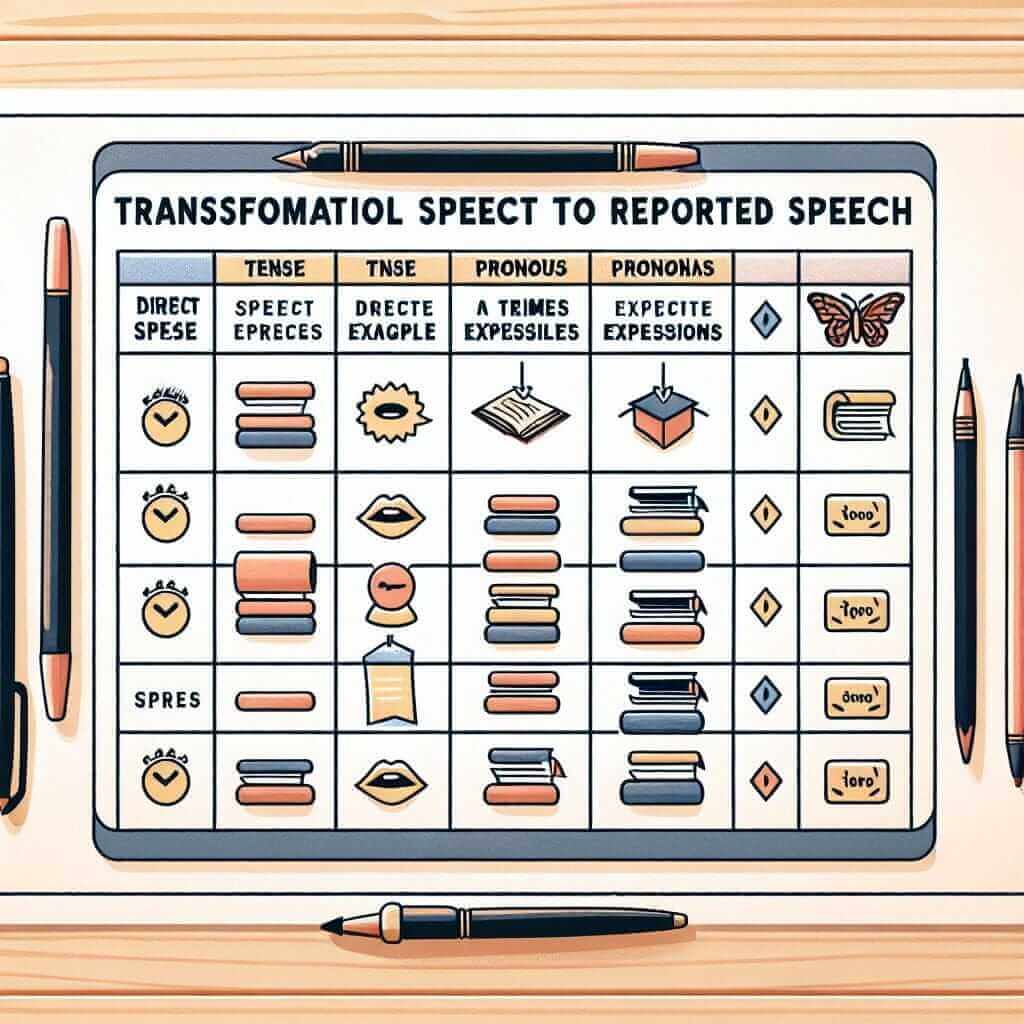Reported speech, also known as indirect speech, is a crucial grammatical structure that often appears in the IELTS exam, particularly in the Listening and Reading sections. It involves conveying someone else’s words or thoughts without directly quoting them. Mastering reported speech is essential for achieving a high band score in IELTS.
Let’s look at some examples of how reported speech might appear in different sections of the IELTS exam:
Listening Section: You might hear a speaker say, “I’m planning to visit the museum tomorrow”. In the multiple-choice questions, one option could be “The speaker said that he was going to the museum the following day.”
Reading Section: A passage might state, “Scientists believe that climate change is accelerating”. A true/false question might ask, “The passage states that scientists thought climate change was speeding up.”
Speaking Section: When asked about your hobbies, you might say, “My friend told me that joining a book club is a great way to meet people.”
As you can see, being able to understand and use reported speech accurately is vital for success in the IELTS exam.
Understanding Reported Speech in IELTS
Reported speech allows us to convey information from one context to another, often with changes in tense, pronouns, and time expressions. Its frequency in the IELTS exam necessitates a strong understanding of its rules and applications.
Rules and Application of Reported Speech
Let’s delve into the specific rules and nuances of using reported speech:
1. Tense Changes:
| Direct Speech | Reported Speech |
|---|---|
| Simple Present (He says, “I am tired.”) | Simple Past (He said he was tired.) |
| Present Continuous (She says, “I am reading a book.”) | Past Continuous (She said she was reading a book.) |
| Simple Past (He said, “I went to the store.”) | Past Perfect (He said he had gone to the store.) |
| Present Perfect (She says, “I have been to Paris.”) | Past Perfect (She said she had been to Paris.) |
| Will (He says, “I will call you later.”) | Would (He said he would call me later.) |
| Can (She says, “I can swim.”) | Could (She said she could swim.) |
Important Note: If the reporting verb is in the present tense (e.g., “He says”), or if the reported information is still true, the tense may not change.
Example:
- Direct Speech: “The Earth is round,” said the teacher.
- Reported Speech: The teacher said that the Earth is round.
2. Changes in Pronouns and Time Expressions:
Pronouns and time expressions often need to be adjusted to reflect the change in speaker and context.
| Direct Speech | Reported Speech |
|---|---|
| I/me/my | He/she/his/her |
| We/us/our | They/them/their |
| This | That |
| These | Those |
| Here | There |
| Now | Then/ at that time |
| Today | That day |
| Tomorrow | The next day / The following day |
| Yesterday | The day before / The previous day |
Example:
- Direct Speech: “I am going to the cinema tomorrow,” she said.
- Reported Speech: She said that she was going to the cinema the next day.
3. Reporting Verbs:
A variety of reporting verbs can be used to introduce reported speech, each with subtle differences in meaning.
- Neutral: say, tell, state, mention
- Stronger: argue, claim, insist, demand
- Mental states: think, believe, feel, know
Example:
- Direct Speech: “I disagree with the new policy,” said the politician.
- Reported Speech: The politician argued against the new policy.

Using Reported Speech in IELTS
Let’s explore how to effectively utilize reported speech in different sections of the IELTS exam:
1. Listening Section:
Pay close attention to the speaker’s words and any tense changes or shifts in pronouns. Practice identifying the key information being conveyed in reported speech.
Example:
- Audio: “I went to the library yesterday to borrow some books.”
- Question: What did the speaker do yesterday?
- Answer: The speaker said he had gone to the library to borrow some books the day before.
2. Reading Section:
Identify instances of reported speech in passages and understand how the information is being presented differently from the original source.
Example:
- Passage: “The author believes that technology has revolutionized the way we communicate.”
- Question: What is the author’s view on technology?
- Answer: The passage states that the author believes technology has revolutionized communication methods.
3. Speaking and Writing Sections:
Use reported speech to add variety and sophistication to your language. Incorporate different reporting verbs to demonstrate a wider range of vocabulary.
Example:
- Instead of: “My friend said, ‘Let’s go hiking this weekend.'”
- Use: My friend suggested going hiking this weekend.
Common Errors and How to Avoid Them
Here are some common mistakes made with reported speech and tips to avoid them:
- Incorrect Tense Changes: Remember to shift tenses appropriately when using a past tense reporting verb.
- Omitting “That”: While “that” can sometimes be omitted after certain reporting verbs, it’s generally safer to include it.
- Pronoun Agreement: Ensure pronouns agree in number and gender with the original speaker.
- Using the Wrong Reporting Verb: Choose reporting verbs carefully to accurately reflect the speaker’s intention.
Conclusion
Mastering reported speech is crucial for achieving a high band score in the IELTS exam. By understanding the rules, practicing its application, and being aware of common errors, you can confidently navigate this grammatical structure and excel in your IELTS test. Regularly reviewing and practicing reported speech will undoubtedly enhance your overall language skills and boost your confidence on exam day.